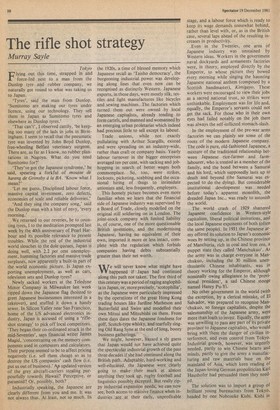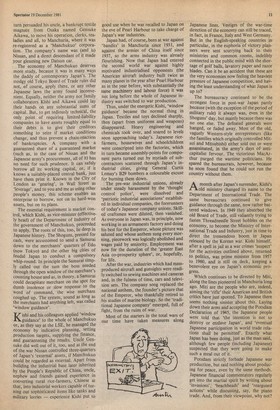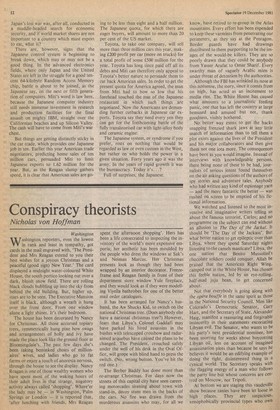The rifle shot strategy
Murray Sayle
Tokyo El lying out this time, strapped in and
force-fed next to a man from the Dunlop tyre and rubber company, we naturally got round to what was taking us to Japan.
'Tyres', said the man from Dunlop.
'Sumitomo are making our tyres under licence, using our technology. They sell them in Japan as Sumitomo tyres and elsewhere as Dunlop tyres.'
'That can't', I observed cattily, 'be keep ing too many of the lads in jobs in Birmingham. I seem to recall that the pneumatic tyre was invented by John Boyd Dunlop, free-wheeling Belfast veterinary surgeon. There are, as far as I know, no rubber plantations in Nagoya. What do you need Sumitomo for?'
'They've got the Japanese syndrome,' he said, spearing a forkful of mousse de hareng de Grimsby a la BA. 'Know what I mean?'
'Let me guess. Disciplined labour force, massive capital investment, zero defects, economies of scale and reliable deliveries.' 'And they sing the company song,' said the Dunlop man with a hint of envy, 'every morning.'
We returned to our reveries, he to counting tyres, I to the meditation prompted last week by the 40th anniversary of Pearl Harbour and its possible relevance to present troubles. While the rest of the industrial world slouches to the dole queues, Japan is doing well, with 2.2 per cent unemployment, humming factories and massive trade surpluses, now apparently a built-in part of the world economic picture. Is Japan exporting unemployment, as well as cars, television sets and Dunlop tyres?
Newly sacked workers at the Teledyne Motor Company in Milwaukee last week ripped down the Japanese flag (hoisted to greet Japanese businessmen interested in a takeover), and stuffed it down a handy sewer. In Silicon Valley near San Francisco, home of the US advanced electronics industry, Japan is accused of using a 'rifleshot strategy' to pick off local competitors. 'They began their co-ordinated attack in the mid-Seventies', says financial writer James Magid, 'concentrating on the memory components used in computers and calculators. Their purpose seemed to be to affect pricing negatively (i.e. sell them cheap) so as to destroy the US companies' cash flow (i.e. put us out of business).' Ail updated version of the grey aircraft-carriers stealing purposefully towards Hawaii? Perceptive, or paranoid? Or, possibly, both?
Industrially speaking, the Japanese are clearly different from you and me. It was not always thus. At least, not so much. In the 1920s, a time of blessed memory which Japanese recall as 'Taisho democracy', the burgeoning industrial power was developing along lines that even now can be recognised as distinctly Western. Japanese exports, in those days, were mostly silk, textiles and light manufactures like bicycles and sewing machines. The factories which turned them out were owned by local Japanese capitalists, already tending to form cartels, and manned and womanned by an emerging urban proletariat which indeed had precious little to sell except its labour.
Trade unions, while not exactly pullulating with Arthur Scargills, existed and were spreading on an industry-wide, rather than craft or company basis. Yearly labour turnover in the bigger enterprises averaged ten per cent, with sacking and jobhopping in search of better wages both commonplace. So, too, were strikes, lockouts, picketing, scabbing and the occasional hiring of thugs to intimidate unionists and, less frequently, employers.
This homely picture becomes even more familiar when we learn that the financial side of Japanese industry was supervised by a Board of Trade, closely modelled on the original still soldiering on in London. The joint-stock company with limited liability is, of course, one of the more questionable British inventions, and the modernising Japanese, having no equivalent of their own, imported it more or less intact, complete with the regulation which forbids companies having debts substantially greater than their net worth.
We will never know what might have happened if Japan had continued along this path not taken. The first third of this century was a period of raging anglophilia in Japan, or, more precisely, `scotophilia', as the Japanese were particularly impressed by the operations of the great Hong Kong trading houses like Jardine Matheson and Butterfield and Swire and modelled their own Mitsui and Mitsubishi on them. From these days dates the Japanese fondness for golf, Scotch-type whisky, and tearfully singing Old Rang Syne at the end of long, boozy business gatherings.
We might, however, hazard a sly guess that Japan would not have achieved quite the spectacular industrial growth of the past three decades if she had continued along the British path. Adaptable, hard-working and well-educated, the Japanese were clearly going to make their mark at almost anything they took up, rugby football and linguistics possibly excepted. But really zip py industrial expansion needs, we can now see, both access to massive finance when industries are at their early, unprofitable stage, and a labour force which is ready to keep its wage demands somewhat behind, rather than level with, or, as in the British case, several laps ahead of the resulting increases in productivity.
, Even in the Twenties, one area of Japanese industry was unstained by Western ideas. Workers in the government naval dockyards and armaments factories were, in theory, employed directly by the Emperor, to whose picture they bowed every morning while singing the haunting Japanese national anthem (composed by a Scottish bandmaster), Kitnigayo. These workers were encouraged to view their jobs as a sacred national trust, so strikes were unthinkable. Employment was for life and, equally, the Emperor's servants could not get the sack. For those who in their own eyes had failed notably on the job there was always the self-inflicted stomach-slash.
In the employment of the pre-war arms factories we can plainly see some of the roots of the modern Japanese company. The code is pure, old-fashioned Japanese, a mixture of the traditional relationship between Japanese rice-farmer and farmlabourer, who is treated as a member of the family, and the bond between a Samurai and his lord, which supposedly lasts up to death and beyond (the Samurai was expected to do the dying). But considerable institutional development was needed before today's apparent monolith, the dreaded Japan Inc., was ready to astonish the world.
The world crash of 1929 shattered Japanese confidence in Western-style capitalism, liberal political insitutions, and the local Japanese exponents of both (often the same people). In 1931 the Japanese army offered its solution to Japan's economic woes by setting up, in the Chinese province of Manchuria, rich in coal and iron ore, a puppet state they called 'Manchukuo'. AS the army was in charge everyone in Manchukuo, including the 30 million unenthusiastic Chinese inhabitants, was in theory working for the Emperor, although nominally owing alliegiance to the 'provisional president', a sad Chinese stooge named Hanry Pu-Yi.
No other government in the world (with the exception, by a clerical mistake, of El Salvador, was prepared to recognise Man' chukuo, so foreign capitalists, despite the salesmanship of the Japanese army, were more than loath to invest. Equally, the army was unwilling to pass any part of its private province to Japanese capitalists, who would bring with them the danger of civilian interference, and even control from Tokyo. Industrial growth, however, was urgently needed, partly to win Chinese hearts and minds, partly to give the army a manufacturing and raw materials base on the mainland of Asia, which keen reading of the Japan-loving German geopolitician Karl Haushofer had persuaded them they needed.
The solution was to import a group of brilliant young bureaucrats from Tokyo, headed by one Nobosuke Kishi. Kishi jil turn persuaded his uncle, a bankrupt textile magnate from Osaka named Gensuke Aikawa, to move his operation, clerks, tealadies and all, to Manchuria, where it was re-registered as a 'Manchukuo' corporation. The company's name was (and is) Nissan, and a direct descendant of it made your gleaming new Datsun car.
The economy of Manchukuo deserves more study, because it was in many ways the daddy of contemporary Japan's. The stodgy old Tokyo Board of Trade rules did not, of course, apply there, or any other Japanese laws the army found inconve nient. Equally, neither the army nor family collaborators Kishi and Aikawa could lay their hands on any substantial sums of capital. But, to get tediously technical, the only point of requiring limited-liability companies to have assets roughly equal to their debts is to give their creditors something to seize if market conditions change, and thus prevent a chain-reaction of bankruptcies. A company with a guaranteed share of a guaranteed market (such as, in the case of Nissan and the Japanese army's procurement, all of it) has no need for such prudence. It can safely borrow all its working capital, or, if it knows a suitably-placed central bank, just have them print it. Known in the City of London as 'gearing', in Wall Street as 'leverage', and to you and me as using other people's money, this scheme enables an enterprise to borrow, not on its hard-won assets, but on its plans.
The essential requirement is market control, which Kishi, as vice-minister (effectively head) of the Department of Industry of the government of Manchukuo, proceeded to apply. The roots of this, too, lie deep in Japanese history. The Shoguns, pressed for cash, were accustomed to send a Samurai down to the merchants' quarters of Edo (now Tokyo) and the other big cities of feudal Japan to conduct a compulsory whip-round. In principle the Samurai simply called out the sum the boss needed through the open window of the merchant's counting house and as, in theory, a Samurai could decapitate merchant on the spot for dumb insolence or slow response to the word of command, the wise merchant coughed up. The system, sound as long as the merchants had anything left, was called 'window guidance'.
Kishi and his colleagues applied 'window J-Xguidance' to the whole of Manchukuo or, as they say at the LSE, he managed the economy by indicative planning, setting production targets, supplying the finance, and guaranteeing the results. Uncle Gensuke did well out of it, too, and at the end of the war Nissan controlled three-quarters of Japan's 'external' assets, if Manchukuo could be regarded as external. Apart from building the industrial base later inherited by the People's Republic of China, uncle, nephew and friends gained experience in converting rural rice-farmers, Chinese at that, into industrial workers capable of turning out sophisticated items like tanks and military lorries — experience Kishi put to good use when he was recalled to Japan on the eve of Pearl Harbour to take charge of Japan's war industries.
Japan had, of course, been at war against 'bandits' in Manchuria since 1931, and against the armies of China itself since 1937, so the arms industry was already flourishing. Now that Japan had entered the second world war against highly motivated industrialised opponents (the American aircraft industry built twice as many planes in the year after Pearl Harbour as in the year before, with substantially the same machinery and labour force) it was not long before the whole of Japanese industry was switched to war production.
Thus, under the energetic Kishi, 'window guidance' became the normal thing in Japan. Textiles and toys declined sharply, then (apart from uniforms and weapons) disappeared. Heavy engineering and chemicals took over, and soared to levels soon approaching today's. Japanese ricefarmers, housewives and schoolchildren were conscripted into the factories, which in turn became assembly-points for component parts turned out by myriads of sub contractors scattered through Japan's industrial cities, giving General Curtis Lemay's B29 bombers a colourable excuse for burning them down.
The pre-war industrial unions, already under steady harassment by the 'thought control police', were dissolved and 'patriotic industrial associations' established in individual companies, the forerunners of today's Japanese company unions. Skill ed craftsmen were diluted, then vanished. As everyone in Japan was, in principle, now working in an armaments factory and doing his best for the Emperor, whose picture was saluted and whose anthem sung every mor ning, piecework was logically abolished and wages paid by seniority. Employment was now for the duration of the 'greater East Asia co-prosperity sphere', or, hopefully, for life.
After the war, industries which had massproduced aircraft and gunsights were readi ly switched to sewing machines and cameras and, in the fulness of time, cars and television sets. The company song replaced the national anthem, the founder's picture that of the Emperor, who thankfully retired to his studies of marine biology. So the 'traditional Japanese company' emerged, full of fight, from the ruins of war.
Most of the starters in the total wars of our time have taken measures along Japanese lines. Vestiges of the war-time direction of the economy can still be traced, in fact, in France, Italy and West Germany. But in the English-speaking countries in particular, in the euphoria of victory planners were sent scurrying back to their ministries and common rooms, indelibly connected in the public mind with the shortage of golf balls, lavatory paper and razor blades. Can it be an accident that these are the very economies now feeling the heaviest pressure of Japanese competition, and having the least understanding of what Japan is up to?
The bureaucracy continued to be the strongest force in post-war Japan partly because (with the exception of the period of military rule) it always was, even in the Shoguns' day, but mainly because there was no one else. The defeated generals were hanged, or faded away. Most of the old, vaguely Western-style entrepreneurs (like the families which originally controlled Mitsui and Mitsubishi) either sold out or were assassinated, in the army's days of anticapitalist fervour. The victorious MacArthur purged the wartime politicians. He spared the bureaucrats, however, because he soon found that he could not run the country without them.
Amonth after Japan's surrender, Kishi's old ministry changed its name to the Department of International Trade. The same bureaucrats continued to give guidance through the same, now rather battered windows. In 1949 they absorbed the old Board of Trade, still valiantly trying to fasten Threadneedle Street hobbles on the economy, to become the Ministry of International Trade and Industry, just in time to direct the tremendous boom in Japan released by the Korean war. Kishi himself, after a spell in jail as a war crimes 'suspect' for the activities outlined above, returned to politics, was prime minister from 1957 to 1960, and is still on deck, keeping a benevolent eye on Japan's economic progress.
Which continues to be directed by Miti, along the lines pioneered in Manchuria long ago. Miti are the people who are, indeed, aiming the 'rifle' their American and British critics have just spotted. To Japanese there seems nothing sinister about this. Laying down their arms and accepting the Potsdam Declaration of 1945, the Japanese people were told that 'the intention is not to destroy or enslave Japan', and 'eventual Japanese participation in world trade relations shall be permitted'. Exactly what Japan has been doing, just as the man said, although few people (including Japanese) suspected that they were going to make such a meal out of it.
Potsdam strictly forbade Japanese war production, but said nothing about producing for peace, even by the same methods. Japanese financial commentators regularly get into the martial spirit by writing about 'invasions', 'beachheads' and 'rearguard actions' while discussing, say, the piano trade. And, from their viewpoint, why not? Japan's lost war was, after all, conducted in a muddle-headed search for economic security, and if world market shares are not important to a country which must export to eat, what is?
There are, however, signs that the Japanese control system is beginning to break down, which may or may not be a good thing. In the advanced electronics fields, where only Japan and the United States are left in the struggle for a good tencent 64-kilobyte Random Access Memory chip, battle is about to be joined, as the Japanese say, on the next or fifth generation of computers. Miti's word is law here, because the Japanese computer industry still needs immense investment in research and production facilities for the final assault on mighty IBM, straight over the Californian beaches and up Silicon Valley. The cash will have to come from Miti's war chest.
But things are getting distinctly sticky in the car trade, which provides one Japanese job in ten. Earlier this year American trade negotiators, predicting home sales of ten million cars, persuaded Miti to limit Japanese exports to 1.62 million for the year. But, as the Reagan slump gathers speed, it is clear that American sales are go ing to be less than eight and a half million. The Japanese quota, for which there are eager buyers, will amount to more than 20 per cent of the US market.
Toyota, to take one company, will sell more than three million cars this year, making £200 profit per car (more on trucks) for a total profit of some £500 million for the year. Toyota has long since paid off all its debts and Miti can therefore only appeal to Toyota's better nature to persuade them to cut back American sales. In order to get the present quota for America agreed, the man from Miti had to bow so low that his forehead touched the mat of the Japanese restaurant in which such things are negotiated. Now the Americans are demanding further cutbacks in Japanese car exports. Toyota say they need every yen they can get for the forthcoming battle of the fully transistorised car with light-alloy body and ceramic engine.
The Japanese system, or syndrome if you prefer, rests on nothing that would be regarded as law or even custom in the West, but rather on who holds the power in a given situation. Forty years ago it was the army. In the years of rapid growth it was the bureaucracy. Today it's ...?
Full of surprises, the Japanese.




































































 Previous page
Previous page